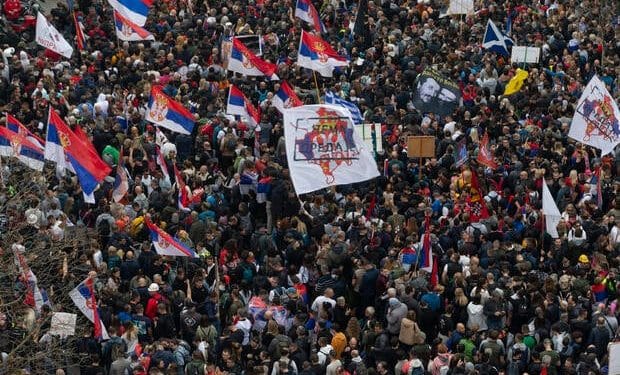On Saturday, tens of thousands marched through Belgrade as part of the culmination of protests that have lasted for months against Serbian populist president Aleksandar Vucic.
After meeting at various protest sites in different parts of the city, which had been placed on high alert, large crowds of protesters waving flags converged. All public transport was suspended.
Vucic warned repeatedly of supposed plans for unrest ahead of the protest, threatening arrests for any incident and harsh sentences.
On Saturday, a deafening noise of drums, whistles and vuvuzelas filled up the air. Some protesters held banners with the words “He’s finished!” The crowds chanted, “Pump It Up,” the slogan used during student-led demonstrations over the past four months.
Milenko Kovacevic said that he expected that the protests would shake Vucic’s authority and make him realize that his supporters were no longer with him.
The anti-corruption protests that began more than four months ago have been the most significant challenge to Vucic’s hold on power in 13 years.
The nationwide anti-graft campaign was led by university students protesting after a concrete canopy fell at a train terminal in the north of Serbia on November 1. It killed 15 people. The crash was blamed by many in Serbia on government corruption, negligence and disregard for construction safety regulations.
Tens of thousands welcomed the students from Serbia who had been cycling or marching for days towards Belgrade.
Ivica Daci, the interior minister, told RTS that 13 people had been detained over night. He said six opposition activists were detained by police for allegedly plotting a coup or stirring unrest.
On Saturday morning, the crowds had gathered in different parts of the city and were marching towards the center. Hours before the planned start, the entire downtown area was filled with people.
Police said that they had arrested a driver who drove his car into three protesters in Belgrade’s suburb, causing injuries. The police deployed hundreds of officers inside government buildings, in front of presidential palace and all around them.
Belgrade authorities cancelled all public transport including intercity rail and bus links in an apparent attempt to stop people from attending this rally. The transport company claimed that the cancellation was due to “security reasons.”
The border guards of Serbia turned away several journalists from Croatia and Slovenia, claiming that their presence “represented a security threat.”
Vucic rejected previous proposals for a government transition that would prepare early elections. Vucic supporters are camping in the central Belgrade area in front of Vucic’s headquarters, fueling fears of clashes. Former members of the feared paramilitary group that was involved in the 2003 assassination of Serbia’s first democracy Prime Minister Zoran Dindjic as well as violent soccer hooligans are among them.
On Saturday, N1 broadcast footage showing dozens of young boys wearing baseball caps entering the pro-Vucic camps.
Vucic claims that Western intelligence services are behind the almost daily student protests, with a goal to remove him from power. He has not provided any evidence to support his claims.
The students have made a strong impression on citizens who have become disillusioned by politicians and lost their faith in state institutions. Previous student-led protests in Serbian cities were peaceful, while drew huge crowds.
In the first week of this month, three legislators, one of whom was seriously injured, were hurt in a chaotic scene that took place at Serbia’s Parliament. Smoke bombs and flares had been thrown during these scenes, which further fueled political tensions.






